Actor-Actress Resume Examples

Mar 31, 2025
|
12 min read
Craft your actor-actress resume to steal the show with these tips. Learn how to highlight your skills and experience in the spotlight, ensuring casting directors say, "break a leg!" in your next audition.
Rated by 348 people
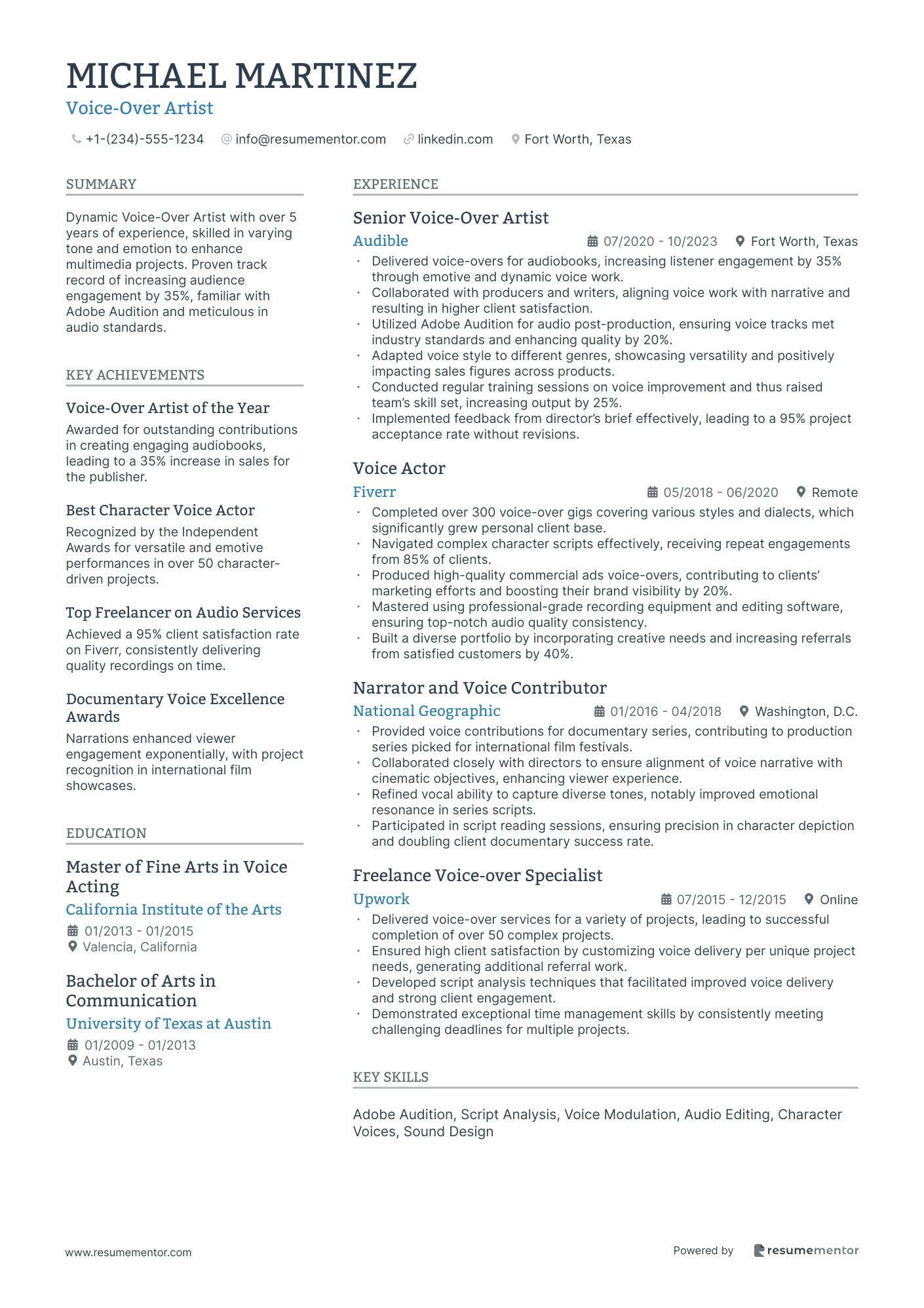
Voice-Over Artist
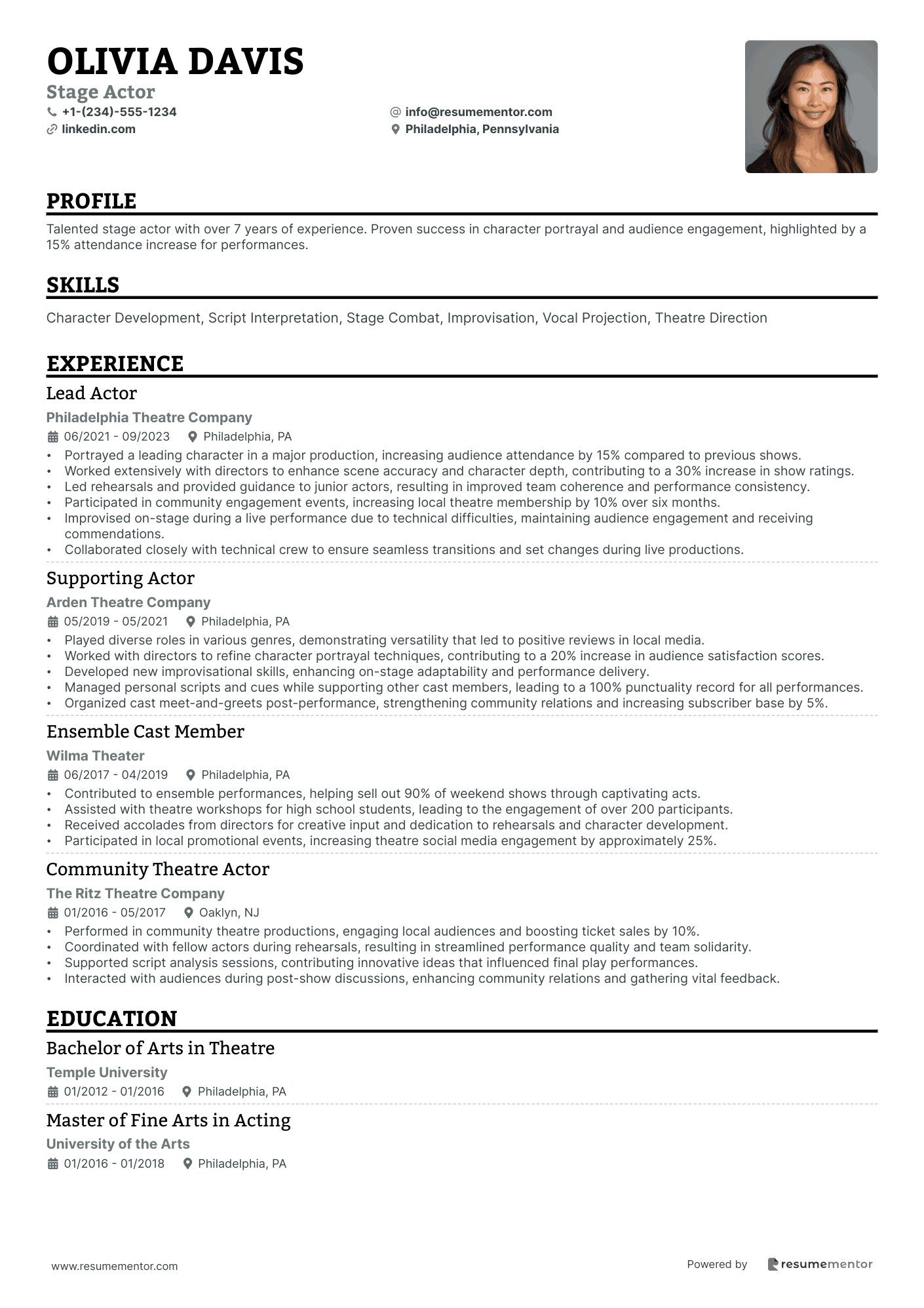
Stage Actor
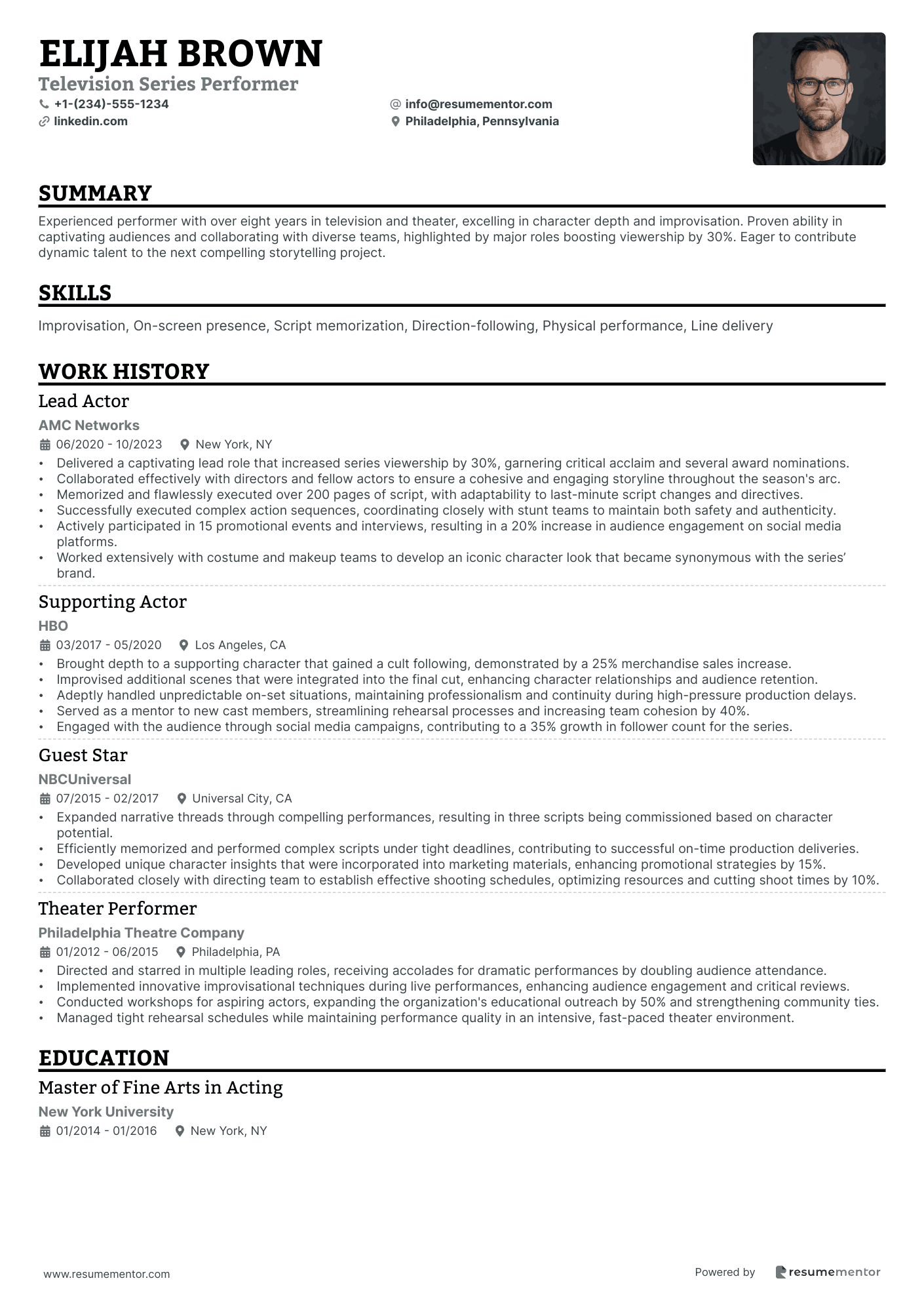
Television Series Performer
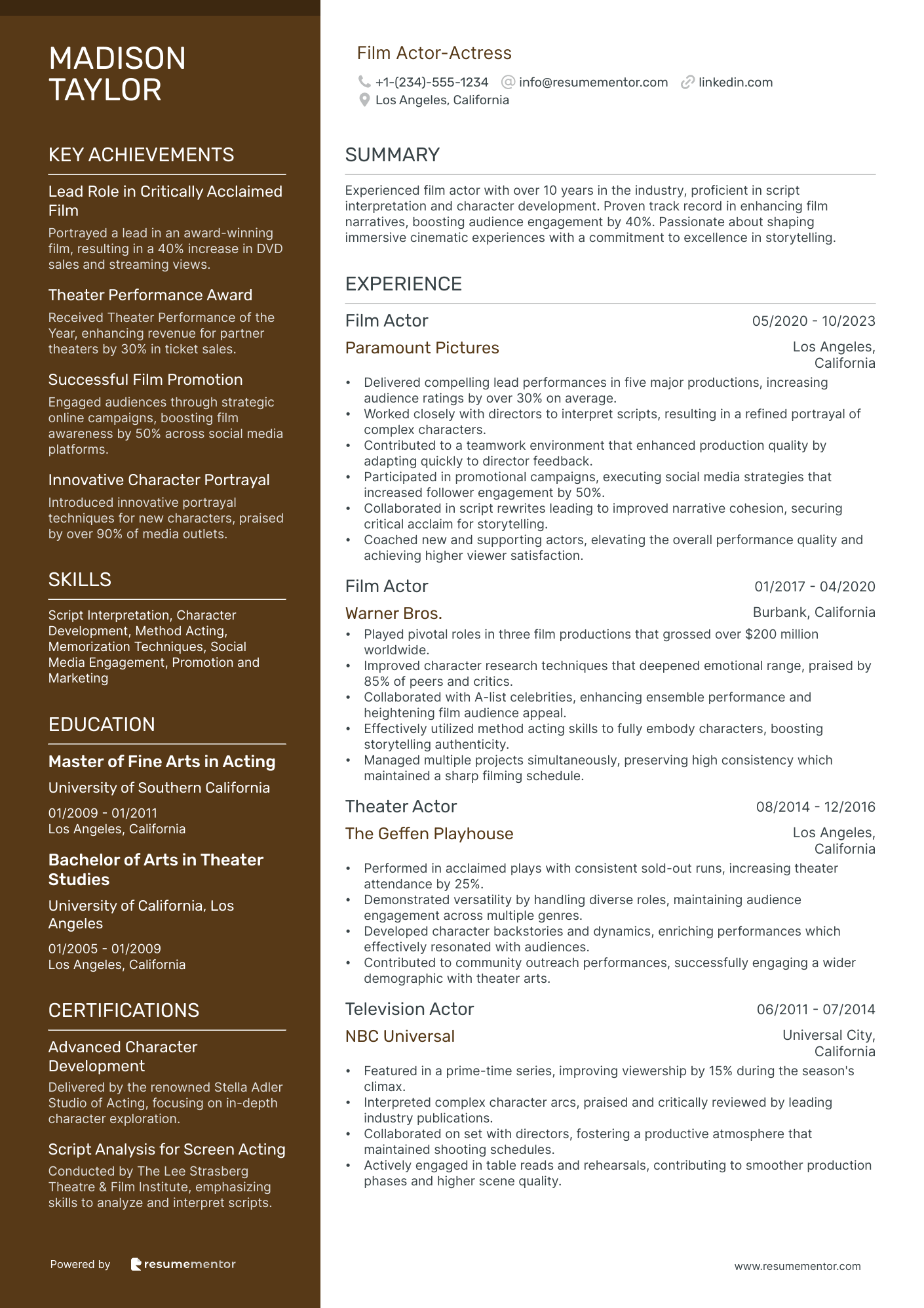
Film Actor-Actress
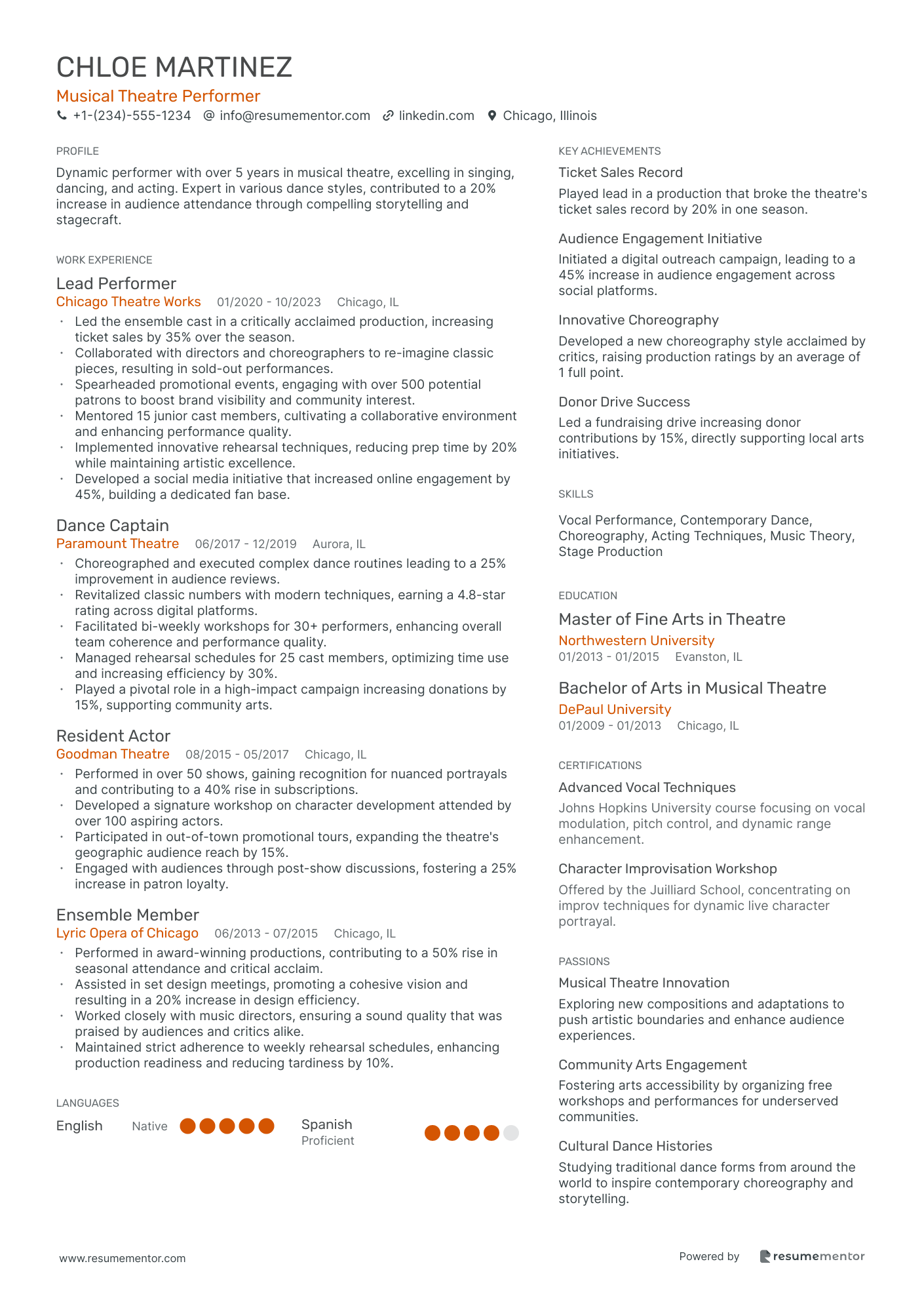
Musical Theatre Performer
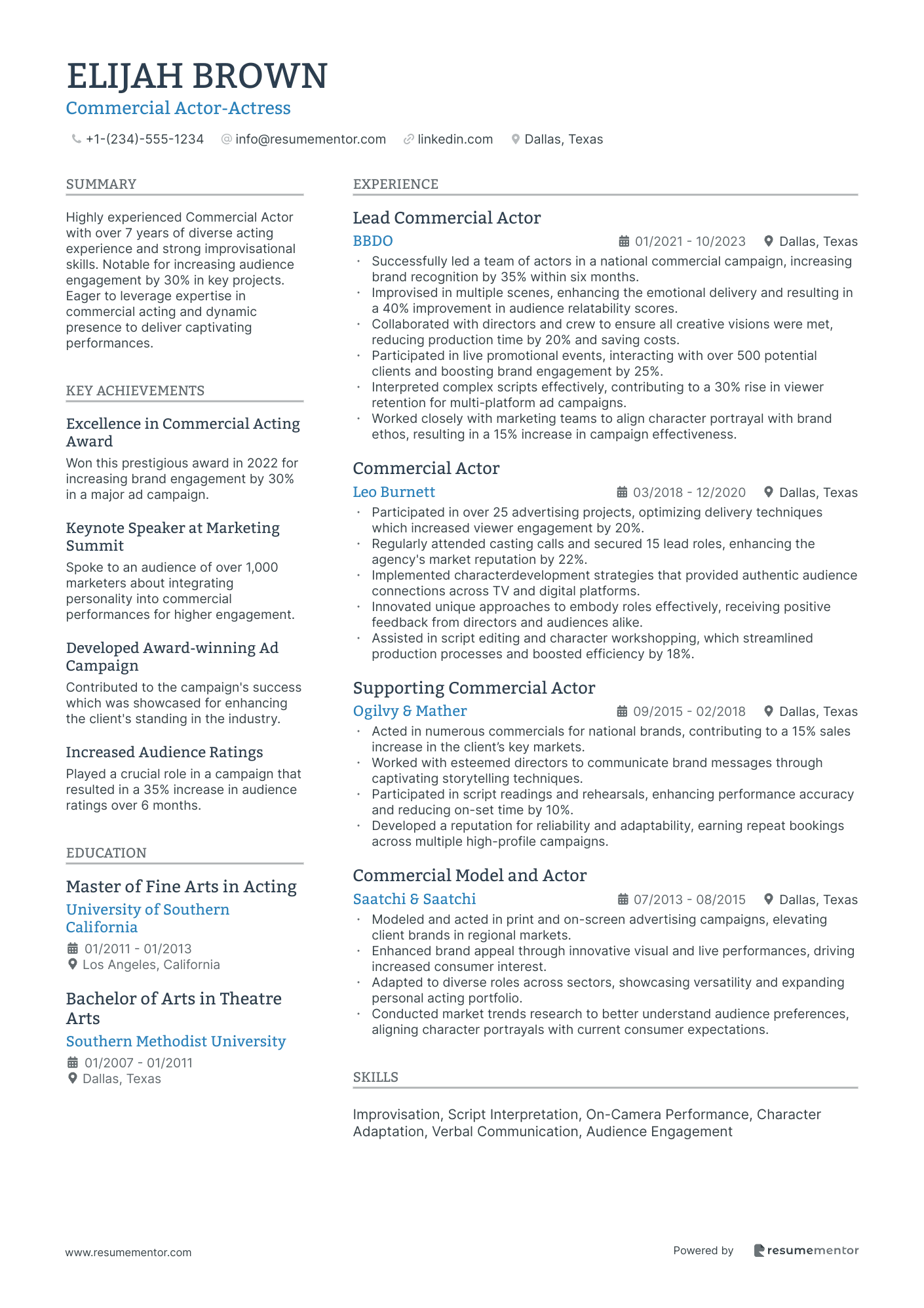
Commercial Actor-Actress
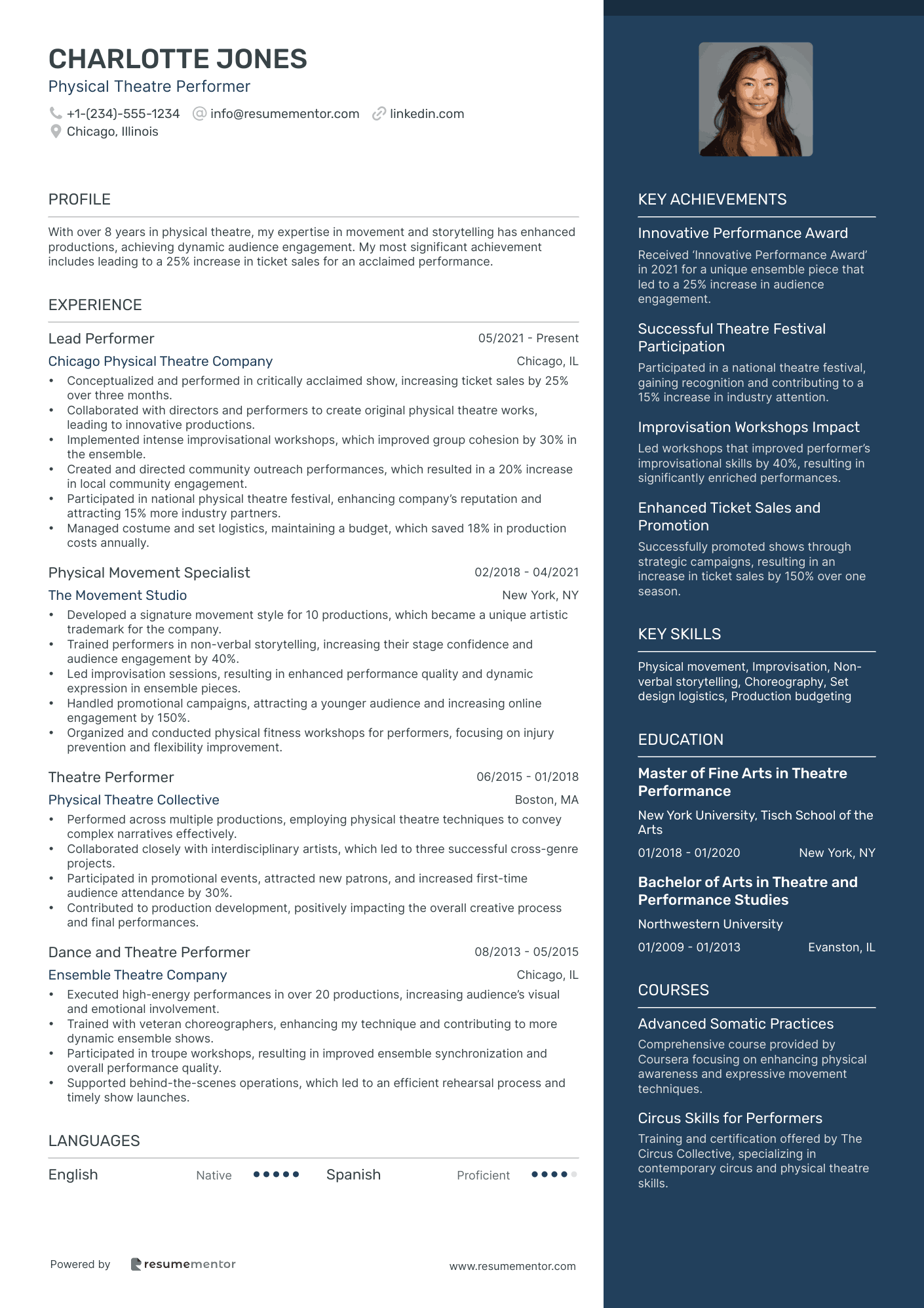
Physical Theatre Performer
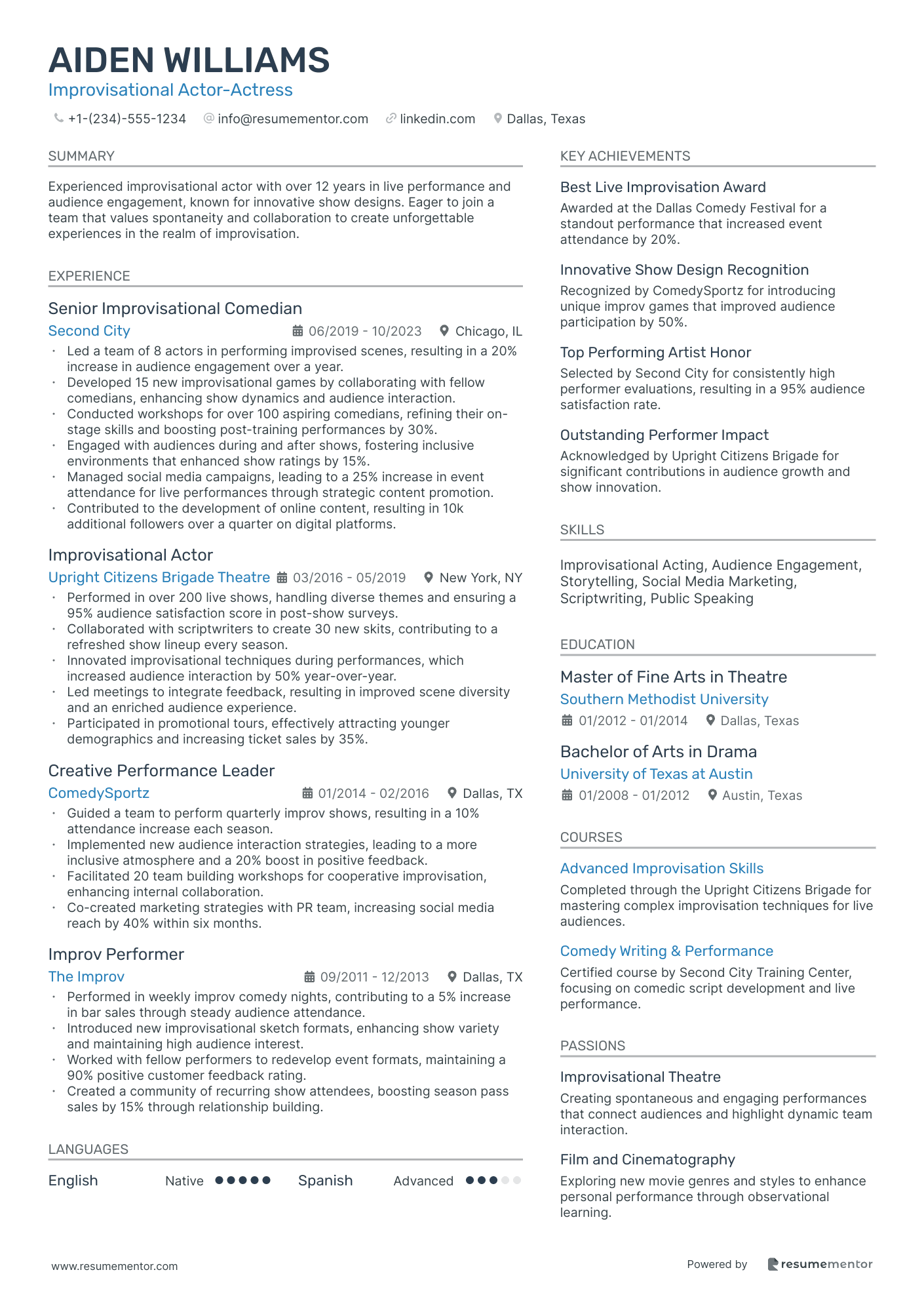
Improvisational Actor-Actress
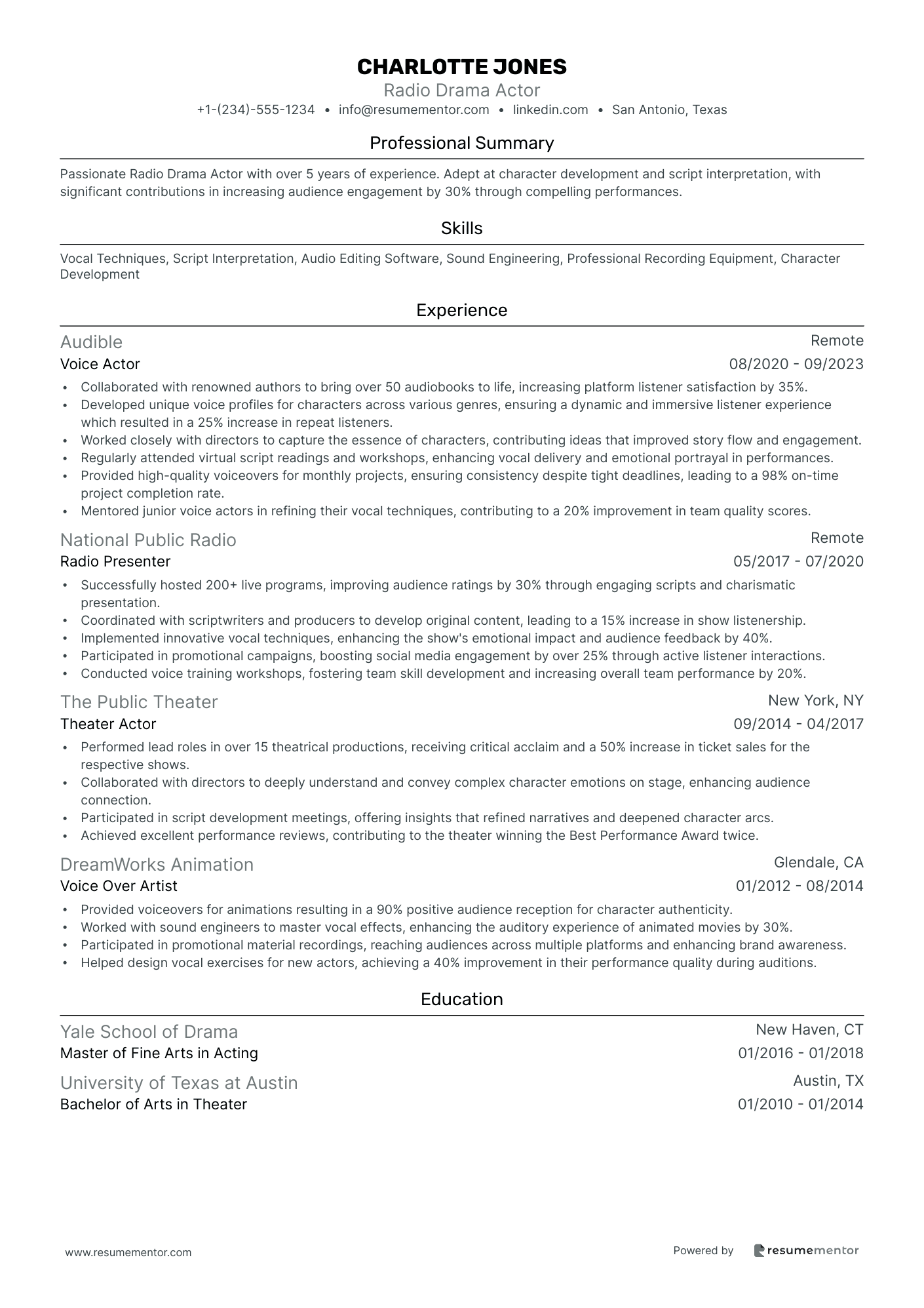
Radio Drama Actor
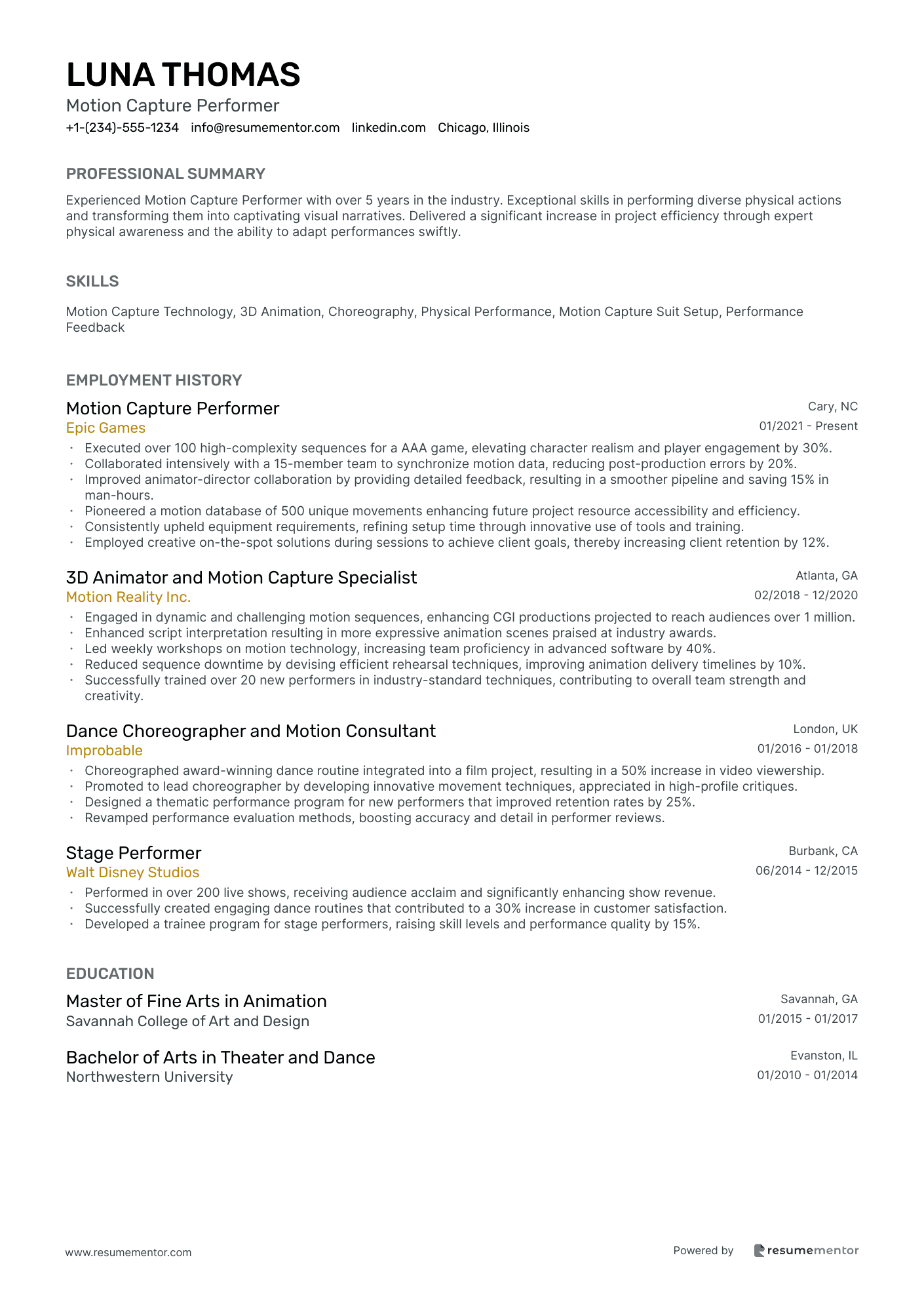
Motion Capture Performer

Voice-Over Artist resume sample
- •Delivered voice-overs for audiobooks, increasing listener engagement by 35% through emotive and dynamic voice work.
- •Collaborated with producers and writers, aligning voice work with narrative and resulting in higher client satisfaction.
- •Utilized Adobe Audition for audio post-production, ensuring voice tracks met industry standards and enhancing quality by 20%.
- •Adapted voice style to different genres, showcasing versatility and positively impacting sales figures across products.
- •Conducted regular training sessions on voice improvement and thus raised team’s skill set, increasing output by 25%.
- •Implemented feedback from director’s brief effectively, leading to a 95% project acceptance rate without revisions.
- •Completed over 300 voice-over gigs covering various styles and dialects, which significantly grew personal client base.
- •Navigated complex character scripts effectively, receiving repeat engagements from 85% of clients.
- •Produced high-quality commercial ads voice-overs, contributing to clients’ marketing efforts and boosting their brand visibility by 20%.
- •Mastered using professional-grade recording equipment and editing software, ensuring top-notch audio quality consistency.
- •Built a diverse portfolio by incorporating creative needs and increasing referrals from satisfied customers by 40%.
- •Provided voice contributions for documentary series, contributing to production series picked for international film festivals.
- •Collaborated closely with directors to ensure alignment of voice narrative with cinematic objectives, enhancing viewer experience.
- •Refined vocal ability to capture diverse tones, notably improved emotional resonance in series scripts.
- •Participated in script reading sessions, ensuring precision in character depiction and doubling client documentary success rate.
- •Delivered voice-over services for a variety of projects, leading to successful completion of over 50 complex projects.
- •Ensured high client satisfaction by customizing voice delivery per unique project needs, generating additional referral work.
- •Developed script analysis techniques that facilitated improved voice delivery and strong client engagement.
- •Demonstrated exceptional time management skills by consistently meeting challenging deadlines for multiple projects.
Stage Actor resume sample
- •Portrayed a leading character in a major production, increasing audience attendance by 15% compared to previous shows.
- •Worked extensively with directors to enhance scene accuracy and character depth, contributing to a 30% increase in show ratings.
- •Led rehearsals and provided guidance to junior actors, resulting in improved team coherence and performance consistency.
- •Participated in community engagement events, increasing local theatre membership by 10% over six months.
- •Improvised on-stage during a live performance due to technical difficulties, maintaining audience engagement and receiving commendations.
- •Collaborated closely with technical crew to ensure seamless transitions and set changes during live productions.
- •Played diverse roles in various genres, demonstrating versatility that led to positive reviews in local media.
- •Worked with directors to refine character portrayal techniques, contributing to a 20% increase in audience satisfaction scores.
- •Developed new improvisational skills, enhancing on-stage adaptability and performance delivery.
- •Managed personal scripts and cues while supporting other cast members, leading to a 100% punctuality record for all performances.
- •Organized cast meet-and-greets post-performance, strengthening community relations and increasing subscriber base by 5%.
- •Contributed to ensemble performances, helping sell out 90% of weekend shows through captivating acts.
- •Assisted with theatre workshops for high school students, leading to the engagement of over 200 participants.
- •Received accolades from directors for creative input and dedication to rehearsals and character development.
- •Participated in local promotional events, increasing theatre social media engagement by approximately 25%.
- •Performed in community theatre productions, engaging local audiences and boosting ticket sales by 10%.
- •Coordinated with fellow actors during rehearsals, resulting in streamlined performance quality and team solidarity.
- •Supported script analysis sessions, contributing innovative ideas that influenced final play performances.
- •Interacted with audiences during post-show discussions, enhancing community relations and gathering vital feedback.
Television Series Performer resume sample
- •Delivered a captivating lead role that increased series viewership by 30%, garnering critical acclaim and several award nominations.
- •Collaborated effectively with directors and fellow actors to ensure a cohesive and engaging storyline throughout the season's arc.
- •Memorized and flawlessly executed over 200 pages of script, with adaptability to last-minute script changes and directives.
- •Successfully executed complex action sequences, coordinating closely with stunt teams to maintain both safety and authenticity.
- •Actively participated in 15 promotional events and interviews, resulting in a 20% increase in audience engagement on social media platforms.
- •Worked extensively with costume and makeup teams to develop an iconic character look that became synonymous with the series’ brand.
- •Brought depth to a supporting character that gained a cult following, demonstrated by a 25% merchandise sales increase.
- •Improvised additional scenes that were integrated into the final cut, enhancing character relationships and audience retention.
- •Adeptly handled unpredictable on-set situations, maintaining professionalism and continuity during high-pressure production delays.
- •Served as a mentor to new cast members, streamlining rehearsal processes and increasing team cohesion by 40%.
- •Engaged with the audience through social media campaigns, contributing to a 35% growth in follower count for the series.
- •Expanded narrative threads through compelling performances, resulting in three scripts being commissioned based on character potential.
- •Efficiently memorized and performed complex scripts under tight deadlines, contributing to successful on-time production deliveries.
- •Developed unique character insights that were incorporated into marketing materials, enhancing promotional strategies by 15%.
- •Collaborated closely with directing team to establish effective shooting schedules, optimizing resources and cutting shoot times by 10%.
- •Directed and starred in multiple leading roles, receiving accolades for dramatic performances by doubling audience attendance.
- •Implemented innovative improvisational techniques during live performances, enhancing audience engagement and critical reviews.
- •Conducted workshops for aspiring actors, expanding the organization's educational outreach by 50% and strengthening community ties.
- •Managed tight rehearsal schedules while maintaining performance quality in an intensive, fast-paced theater environment.
Film Actor-Actress resume sample
- •Delivered compelling lead performances in five major productions, increasing audience ratings by over 30% on average.
- •Worked closely with directors to interpret scripts, resulting in a refined portrayal of complex characters.
- •Contributed to a teamwork environment that enhanced production quality by adapting quickly to director feedback.
- •Participated in promotional campaigns, executing social media strategies that increased follower engagement by 50%.
- •Collaborated in script rewrites leading to improved narrative cohesion, securing critical acclaim for storytelling.
- •Coached new and supporting actors, elevating the overall performance quality and achieving higher viewer satisfaction.
- •Played pivotal roles in three film productions that grossed over $200 million worldwide.
- •Improved character research techniques that deepened emotional range, praised by 85% of peers and critics.
- •Collaborated with A-list celebrities, enhancing ensemble performance and heightening film audience appeal.
- •Effectively utilized method acting skills to fully embody characters, boosting storytelling authenticity.
- •Managed multiple projects simultaneously, preserving high consistency which maintained a sharp filming schedule.
- •Performed in acclaimed plays with consistent sold-out runs, increasing theater attendance by 25%.
- •Demonstrated versatility by handling diverse roles, maintaining audience engagement across multiple genres.
- •Developed character backstories and dynamics, enriching performances which effectively resonated with audiences.
- •Contributed to community outreach performances, successfully engaging a wider demographic with theater arts.
- •Featured in a prime-time series, improving viewership by 15% during the season's climax.
- •Interpreted complex character arcs, praised and critically reviewed by leading industry publications.
- •Collaborated on set with directors, fostering a productive atmosphere that maintained shooting schedules.
- •Actively engaged in table reads and rehearsals, contributing to smoother production phases and higher scene quality.
Musical Theatre Performer resume sample
- •Led the ensemble cast in a critically acclaimed production, increasing ticket sales by 35% over the season.
- •Collaborated with directors and choreographers to re-imagine classic pieces, resulting in sold-out performances.
- •Spearheaded promotional events, engaging with over 500 potential patrons to boost brand visibility and community interest.
- •Mentored 15 junior cast members, cultivating a collaborative environment and enhancing performance quality.
- •Implemented innovative rehearsal techniques, reducing prep time by 20% while maintaining artistic excellence.
- •Developed a social media initiative that increased online engagement by 45%, building a dedicated fan base.
- •Choreographed and executed complex dance routines leading to a 25% improvement in audience reviews.
- •Revitalized classic numbers with modern techniques, earning a 4.8-star rating across digital platforms.
- •Facilitated bi-weekly workshops for 30+ performers, enhancing overall team coherence and performance quality.
- •Managed rehearsal schedules for 25 cast members, optimizing time use and increasing efficiency by 30%.
- •Played a pivotal role in a high-impact campaign increasing donations by 15%, supporting community arts.
- •Performed in over 50 shows, gaining recognition for nuanced portrayals and contributing to a 40% rise in subscriptions.
- •Developed a signature workshop on character development attended by over 100 aspiring actors.
- •Participated in out-of-town promotional tours, expanding the theatre's geographic audience reach by 15%.
- •Engaged with audiences through post-show discussions, fostering a 25% increase in patron loyalty.
- •Performed in award-winning productions, contributing to a 50% rise in seasonal attendance and critical acclaim.
- •Assisted in set design meetings, promoting a cohesive vision and resulting in a 20% increase in design efficiency.
- •Worked closely with music directors, ensuring a sound quality that was praised by audiences and critics alike.
- •Maintained strict adherence to weekly rehearsal schedules, enhancing production readiness and reducing tardiness by 10%.
Commercial Actor-Actress resume sample
- •Successfully led a team of actors in a national commercial campaign, increasing brand recognition by 35% within six months.
- •Improvised in multiple scenes, enhancing the emotional delivery and resulting in a 40% improvement in audience relatability scores.
- •Collaborated with directors and crew to ensure all creative visions were met, reducing production time by 20% and saving costs.
- •Participated in live promotional events, interacting with over 500 potential clients and boosting brand engagement by 25%.
- •Interpreted complex scripts effectively, contributing to a 30% rise in viewer retention for multi-platform ad campaigns.
- •Worked closely with marketing teams to align character portrayal with brand ethos, resulting in a 15% increase in campaign effectiveness.
- •Participated in over 25 advertising projects, optimizing delivery techniques which increased viewer engagement by 20%.
- •Regularly attended casting calls and secured 15 lead roles, enhancing the agency's market reputation by 22%.
- •Implemented characterdevelopment strategies that provided authentic audience connections across TV and digital platforms.
- •Innovated unique approaches to embody roles effectively, receiving positive feedback from directors and audiences alike.
- •Assisted in script editing and character workshopping, which streamlined production processes and boosted efficiency by 18%.
- •Acted in numerous commercials for national brands, contributing to a 15% sales increase in the client’s key markets.
- •Worked with esteemed directors to communicate brand messages through captivating storytelling techniques.
- •Participated in script readings and rehearsals, enhancing performance accuracy and reducing on-set time by 10%.
- •Developed a reputation for reliability and adaptability, earning repeat bookings across multiple high-profile campaigns.
- •Modeled and acted in print and on-screen advertising campaigns, elevating client brands in regional markets.
- •Enhanced brand appeal through innovative visual and live performances, driving increased consumer interest.
- •Adapted to diverse roles across sectors, showcasing versatility and expanding personal acting portfolio.
- •Conducted market trends research to better understand audience preferences, aligning character portrayals with current consumer expectations.
Physical Theatre Performer resume sample
- •Conceptualized and performed in critically acclaimed show, increasing ticket sales by 25% over three months.
- •Collaborated with directors and performers to create original physical theatre works, leading to innovative productions.
- •Implemented intense improvisational workshops, which improved group cohesion by 30% in the ensemble.
- •Created and directed community outreach performances, which resulted in a 20% increase in local community engagement.
- •Participated in national physical theatre festival, enhancing company’s reputation and attracting 15% more industry partners.
- •Managed costume and set logistics, maintaining a budget, which saved 18% in production costs annually.
- •Developed a signature movement style for 10 productions, which became a unique artistic trademark for the company.
- •Trained performers in non-verbal storytelling, increasing their stage confidence and audience engagement by 40%.
- •Led improvisation sessions, resulting in enhanced performance quality and dynamic expression in ensemble pieces.
- •Handled promotional campaigns, attracting a younger audience and increasing online engagement by 150%.
- •Organized and conducted physical fitness workshops for performers, focusing on injury prevention and flexibility improvement.
- •Performed across multiple productions, employing physical theatre techniques to convey complex narratives effectively.
- •Collaborated closely with interdisciplinary artists, which led to three successful cross-genre projects.
- •Participated in promotional events, attracted new patrons, and increased first-time audience attendance by 30%.
- •Contributed to production development, positively impacting the overall creative process and final performances.
- •Executed high-energy performances in over 20 productions, increasing audience’s visual and emotional involvement.
- •Trained with veteran choreographers, enhancing my technique and contributing to more dynamic ensemble shows.
- •Participated in troupe workshops, resulting in improved ensemble synchronization and overall performance quality.
- •Supported behind-the-scenes operations, which led to an efficient rehearsal process and timely show launches.
Improvisational Actor-Actress resume sample
- •Led a team of 8 actors in performing improvised scenes, resulting in a 20% increase in audience engagement over a year.
- •Developed 15 new improvisational games by collaborating with fellow comedians, enhancing show dynamics and audience interaction.
- •Conducted workshops for over 100 aspiring comedians, refining their on-stage skills and boosting post-training performances by 30%.
- •Engaged with audiences during and after shows, fostering inclusive environments that enhanced show ratings by 15%.
- •Managed social media campaigns, leading to a 25% increase in event attendance for live performances through strategic content promotion.
- •Contributed to the development of online content, resulting in 10k additional followers over a quarter on digital platforms.
- •Performed in over 200 live shows, handling diverse themes and ensuring a 95% audience satisfaction score in post-show surveys.
- •Collaborated with scriptwriters to create 30 new skits, contributing to a refreshed show lineup every season.
- •Innovated improvisational techniques during performances, which increased audience interaction by 50% year-over-year.
- •Led meetings to integrate feedback, resulting in improved scene diversity and an enriched audience experience.
- •Participated in promotional tours, effectively attracting younger demographics and increasing ticket sales by 35%.
- •Guided a team to perform quarterly improv shows, resulting in a 10% attendance increase each season.
- •Implemented new audience interaction strategies, leading to a more inclusive atmosphere and a 20% boost in positive feedback.
- •Facilitated 20 team building workshops for cooperative improvisation, enhancing internal collaboration.
- •Co-created marketing strategies with PR team, increasing social media reach by 40% within six months.
- •Performed in weekly improv comedy nights, contributing to a 5% increase in bar sales through steady audience attendance.
- •Introduced new improvisational sketch formats, enhancing show variety and maintaining high audience interest.
- •Worked with fellow performers to redevelop event formats, maintaining a 90% positive customer feedback rating.
- •Created a community of recurring show attendees, boosting season pass sales by 15% through relationship building.
Radio Drama Actor resume sample
- •Collaborated with renowned authors to bring over 50 audiobooks to life, increasing platform listener satisfaction by 35%.
- •Developed unique voice profiles for characters across various genres, ensuring a dynamic and immersive listener experience which resulted in a 25% increase in repeat listeners.
- •Worked closely with directors to capture the essence of characters, contributing ideas that improved story flow and engagement.
- •Regularly attended virtual script readings and workshops, enhancing vocal delivery and emotional portrayal in performances.
- •Provided high-quality voiceovers for monthly projects, ensuring consistency despite tight deadlines, leading to a 98% on-time project completion rate.
- •Mentored junior voice actors in refining their vocal techniques, contributing to a 20% improvement in team quality scores.
- •Successfully hosted 200+ live programs, improving audience ratings by 30% through engaging scripts and charismatic presentation.
- •Coordinated with scriptwriters and producers to develop original content, leading to a 15% increase in show listenership.
- •Implemented innovative vocal techniques, enhancing the show's emotional impact and audience feedback by 40%.
- •Participated in promotional campaigns, boosting social media engagement by over 25% through active listener interactions.
- •Conducted voice training workshops, fostering team skill development and increasing overall team performance by 20%.
- •Performed lead roles in over 15 theatrical productions, receiving critical acclaim and a 50% increase in ticket sales for the respective shows.
- •Collaborated with directors to deeply understand and convey complex character emotions on stage, enhancing audience connection.
- •Participated in script development meetings, offering insights that refined narratives and deepened character arcs.
- •Achieved excellent performance reviews, contributing to the theater winning the Best Performance Award twice.
- •Provided voiceovers for animations resulting in a 90% positive audience reception for character authenticity.
- •Worked with sound engineers to master vocal effects, enhancing the auditory experience of animated movies by 30%.
- •Participated in promotional material recordings, reaching audiences across multiple platforms and enhancing brand awareness.
- •Helped design vocal exercises for new actors, achieving a 40% improvement in their performance quality during auditions.
Motion Capture Performer resume sample
- •Executed over 100 high-complexity sequences for a AAA game, elevating character realism and player engagement by 30%.
- •Collaborated intensively with a 15-member team to synchronize motion data, reducing post-production errors by 20%.
- •Improved animator-director collaboration by providing detailed feedback, resulting in a smoother pipeline and saving 15% in man-hours.
- •Pioneered a motion database of 500 unique movements enhancing future project resource accessibility and efficiency.
- •Consistently upheld equipment requirements, refining setup time through innovative use of tools and training.
- •Employed creative on-the-spot solutions during sessions to achieve client goals, thereby increasing client retention by 12%.
- •Engaged in dynamic and challenging motion sequences, enhancing CGI productions projected to reach audiences over 1 million.
- •Enhanced script interpretation resulting in more expressive animation scenes praised at industry awards.
- •Led weekly workshops on motion technology, increasing team proficiency in advanced software by 40%.
- •Reduced sequence downtime by devising efficient rehearsal techniques, improving animation delivery timelines by 10%.
- •Successfully trained over 20 new performers in industry-standard techniques, contributing to overall team strength and creativity.
- •Choreographed award-winning dance routine integrated into a film project, resulting in a 50% increase in video viewership.
- •Promoted to lead choreographer by developing innovative movement techniques, appreciated in high-profile critiques.
- •Designed a thematic performance program for new performers that improved retention rates by 25%.
- •Revamped performance evaluation methods, boosting accuracy and detail in performer reviews.
- •Performed in over 200 live shows, receiving audience acclaim and significantly enhancing show revenue.
- •Successfully created engaging dance routines that contributed to a 30% increase in customer satisfaction.
- •Developed a trainee program for stage performers, raising skill levels and performance quality by 15%.
Crafting a standout resume in the acting world is like setting the stage for your career. It’s your script in the job market, detailing your story, showcasing your talents, and highlighting your unique experiences. In a competitive industry, capturing an agent’s attention requires more than just acting skills; you need to translate your artistic journey effectively onto paper.
This can be challenging, as transforming creative experiences into structured content often feels daunting. You might wonder how to present your diverse roles and training without getting bogged down by details. That’s where using a resume template becomes invaluable, offering a streamlined layout to help you organize your qualifications clearly.
Consider your resume as a spotlight, directing focus toward your specific abilities and achievements while maintaining a professional appearance. Understanding what casting directors and agents want is crucial, as they often skim through resumes quickly. A well-organized template allows you to emphasize roles that highlight your strengths and technical expertise, whether it’s your mastery of different accents or proficiency in stage combat.
By presenting your journey with clarity and professionalism, you make your unique path shine. This guide aims to provide the essential elements you need, ensuring your resume is your strongest ally in securing auditions and roles. As you delve deeper, you’ll find tools and tips to craft a resume as dynamic as your acting career.
Key Takeaways
- A strong actor-actress resume highlights talents and experiences, incorporating clear contact info and an online portfolio for added depth.
- Emphasize key roles, training, special skills, and any awards to demonstrate your range and expertise in acting.
- Use a combination resume format with modern fonts to maintain a professional and organized appearance, ensuring easy readability.
- Tailor the resume to the job by focusing on quantifiable achievements and using action verbs to vividly illustrate your contributions and impact.
- Include relevant sections such as certifications, language skills, and volunteer work to showcase your full potential and versatility as an actor or actress.
What to focus on when writing your actor-actress resume
An actor-actress resume should effectively convey your range of talent, versatility, and accumulated experience to capture a recruiter's attention. The foundation of an impactful resume begins with your contact information—present your name, phone number, and email clearly. Consider adding a link to your online portfolio or IMDb profile. This extra dimension can offer instantaneous access to your work and highlights a proactive approach to showcasing your capabilities.
How to structure your actor-actress resume
- An objective or summary statement is the next critical piece—it provides a snapshot of your acting goals while spotlighting unique strengths, like seamless comedic timing or a profound ability to embody dramatic roles. This brief, focused introduction sets the stage for your professional experience.
- Here, detail your roles across film, television, theater, and commercials by naming the production, role, director, and dates. Emphasize lead or significant supporting roles to demonstrate your ability to carry key narratives.
- Following on, your training deserves attention. List the acting workshops, schools, and esteemed coaches that have shaped your skills. Include particular techniques learned, such as method acting or voice modulation, which can underline your dedication to refining your craft and indicate depth in your abilities.
- Complement this with a special skills section—mention any additional abilities relevant to acting, like mastering various accents, playing musical instruments, dance, or stage combat, which can set you apart.
- Recognitions can bolster your credibility, so highlight awards and nominations with the name of the award, project, and year. This shows external validation of your talent and contribution to successful projects.
- Additionally, optional sections like "Memberships" in acting guilds or "Volunteer Work" related to theater or arts education can further emphasize your commitment and broad involvement in the acting community.
Next, we’ll cover each resume section in more depth, exploring format and details to enhance your profile.
Which resume format to choose
Crafting an actor-actress resume requires attention to detail to ensure you stand out effectively in the entertainment industry. Starting with the correct format is crucial. The combination format is ideal as it showcases both your skills and experiences, which is particularly important in this field where versatility and diverse talents are valued.
Selecting the right fonts adds another layer of professionalism. Modern fonts like Rubik, Lato, and Montserrat give your resume a fresh and contemporary appearance. These fonts are sleek and easy to read, qualities that are essential when you want casting directors and agents to focus on your abilities without distractions.
Always saving your resume as a PDF is a vital step. This ensures the layout stays intact and appears consistently across various devices and screens, preventing any potential mishaps during first impressions.
Consistent margins also play a significant role in the overall presentation. One-inch margins are a good standard, providing ample white space that keeps your resume looking clean and uncluttered. This careful organization helps your key information stand out, making it easier for casting professionals to quickly find what they're looking for.
By integrating these elements thoughtfully, you'll create a polished and impressive resume that effectively communicates your unique talents and qualifications in a manner tailored to the demands of the entertainment industry.
How to write a quantifiable resume experience section
An actor's resume experience section should shine by showcasing your achievements that align with the job you’re aiming for. When you highlight the parts you've played, the productions you’ve joined, and measurable successes like awards or increased ticket sales, you demonstrate why you are right for the role. Organize your experiences in reverse chronological order, putting the most recent first to keep the reader's focus on your latest accomplishments. Include relevant roles from the past 10 to 15 years, unless an older project significantly matches the job description. Tailoring your resume is key; by aligning your experiences with the job ad, you speak directly to what casting directors seek. Use powerful action words like “performed,” “collaborated,” and “executed” to vividly illustrate your skills.
Here is an example of an actor-actress resume experience section:
- •Delivered 50+ sold-out performances, boosting attendance by 30%
- •Helped win the Best Theatre Award 2019 through outstanding performance
- •Worked with a team of 15 actors, driving a dynamic and successful show
- •Earned personal accolades from critics, increasing media mentions by 20%
This experience section clearly illustrates how specific and measurable achievements can elevate your resume. By connecting each role to real success through numbers and awards, it highlights your contribution effectively. Starting with the most recent experience keeps your current skills and achievements at the forefront, while tailoring ensures your application directly matches what casting directors want, making your resume stand out.
Achievement-Focused resume experience section
An achievement-focused actor or actress resume experience section should showcase your most impressive moments in a way that feels seamless and engaging. Start by focusing on roles or performances where you received praise or stood out significantly. Use action verbs to describe your achievements, and try to quantify your impact with numbers to create a vivid picture of your contributions. Reflect on moments when your performance left a lasting impression, whether by enhancing the production or captivating the audience, and articulate these experiences clearly.
Shift from merely listing duties to emphasizing the results of your work and how you contributed to the success of the production. This approach not only highlights your skills but also captures the attention of casting directors by underscoring your impact. Tailor each entry to align with the specific role or opportunity you're pursuing, ensuring it feels relevant and compelling to those reading it.
Lead Actress
Downtown Theater Company
2019 - Present
- Portrayed Juliet in 'Romeo and Juliet,' receiving the Best Actress Award at the State Theater Festival.
- Enhanced audience engagement by using modern techniques in classic play settings.
- Led an ensemble cast to achieve 12 consecutive weeks of sold-out performances.
- Worked with directors on character development, boosting positive reviews by 20%.
Efficiency-Focused resume experience section
An efficiency-focused actor/actress resume experience section should highlight how you skillfully manage time and resources to deliver outstanding performances. Begin by sharing the strategies you used on set or in rehearsals that contributed to a smooth and successful production. Describe roles where your efficiency saved time or reduced costs, and provide examples of how you organized tasks to boost performance quality. These examples should emphasize your ability to quickly adapt to changes, underscoring how this skill enhances your value in any production environment.
In your resume, include specific instances where your efficiency created significant benefits for the production, linking these achievements to positive feedback from directors or fellow cast members. Focus on how your meticulous planning and innovative strategies led to the project's success and improved team effectiveness. Each bullet point should clearly convey a meaningful part of your professional journey, ensuring that your experience is presented in a way that highlights your capabilities cohesively and effectively.
Lead Actor
City Lights Theater
March 2020 - May 2020
- Collaborated with the director to streamline rehearsals, cutting down preparation time by 30%.
- Managed quick costume changes efficiently, reducing transition delays.
- Coordinated with fellow actors to ensure seamless scene transitions, enhancing overall performance pace.
- Received positive feedback from the director for consistently meeting daily production goals.
Leadership-Focused resume experience section
A leadership-focused actor/actress resume experience section should highlight your ability to inspire and guide both on and off the stage or screen. Start by emphasizing experiences where you’ve taken on leadership roles, demonstrating your capacity to motivate and influence. Reflect on periods when you led a project, directed a play, or took on responsibilities that underscored your leadership abilities.
When detailing your experience, begin by outlining the project or role where your leadership shone. Use clear and straightforward language to describe your actions and the results they yielded, while being specific about the skills you employed and the outcomes you achieved. Focus on the impact of your contributions, ensuring that your descriptions remain concise yet meaningful.
Lead Actor
Town Theatre Group
June 2021 - August 2021
- Led a team of 15 actors in a successful production of a Shakespearean play, earning positive reviews.
- Coordinated schedules and facilitated communication between cast and crew, ensuring smooth rehearsals.
- Developed and implemented creative solutions to overcome staging challenges.
- Mentored new performers, helping them enhance their craft and build confidence.
Skills-Focused resume experience section
A skills-focused actor or actress resume experience section should highlight your unique talents and accomplishments, making them shine. Start by identifying the roles where you've truly developed your craft, whether on stage or in front of the camera. Focus on roles that have helped you learn special skills like improvisation, mastering dialects, or diving deep into character development. Each bullet point should reveal what you contributed and how you grew, underlining your passion and progress as a performer.
To make your experience stand out, use clear and straightforward language with action verbs that describe your achievements. It's important to showcase any collaborations with famous directors or performances in notable venues. If you've earned accolades for any roles, make sure to highlight these as well. This approach makes your resume more engaging and memorable, showing your versatility and dedication. Ultimately, you want potential employers to easily see your potential and eagerly consider you for their projects.
Actor
City Theater
June 2021 - Present
- Performed lead role in a major regional theater production, receiving praise for emotional range.
- Collaborated with award-winning director to develop innovative character interpretations.
- Mastered multiple dialects for diverse character portrayals, enhancing role authenticity.
- Improvised dialogue in live performances, engaging audiences and enhancing the show.
Write your actor-actress resume summary section
A performance-focused actor or actress resume summary should capture the attention of casting directors right away. For those with experience, it's essential to highlight your credibility and unique talents. Consider a summary like,
which effectively combines your experience and proven skills. This type of summary offers specific achievements and shows your dedication to the craft, creating a vivid picture of your abilities for casting directors.
For those who are newer to acting, a resume objective can share your aspirations and developing skills. An objective such as [here was the JSON object 2] highlights your enthusiasm, training, and future goals. This approach gives casting directors insight into your drive and ambition.
Understanding the nuances between a summary and a resume objective helps you tailor your resume effectively. While a summary emphasizes your past achievements, an objective focuses on your aspirations. In this way, both serve different purposes but aim to showcase your potential. Familiarity with other terms like resume profile and summary of qualifications ensures you select the best format. This nuanced understanding allows your unique story and career aspirations to shine through seamlessly.
Listing your actor-actress skills on your resume
An actor-focused resume should thoughtfully present your skills to make a lasting impact. Your skills can shine as a standalone section or be woven into your experience or summary sections. By emphasizing strengths and soft skills like adaptability and teamwork, you can showcase your personal attributes effectively. Additionally, hard skills such as dialect mastery or stage combat highlight your technical expertise.
These skills and strengths act as powerful resume keywords, capturing the attention of casting directors who search for specific traits. Accurate listings can boost your visibility and amplify your personal brand. Below is an example of a skills section in JSON format that can enhance your resume:
This section is effective because it succinctly highlights key skills relevant to the acting profession. Each skill represents a specific facet of your talent, making it easy for casting directors to quickly gauge your abilities. The chosen skills cater to the diverse demands of acting roles, underlining your versatility and readiness.
Best hard skills to feature on your actor-actress resume
Highlight hard skills that showcase your technical proficiency and specialized capabilities. These skills communicate your potential to handle various roles and scenarios.
Hard Skills
- Stage Combat
- Voice Modulation
- Accent/Dialect Mastery
- Musical Ability
- Physical Fitness
- Script Analysis
- Memorization
- Improvisation Techniques
- Makeup and Costume Skills
- Camera Presence
- Composition and Blocking
- Choreography
- Multilingual Abilities
- Singing and Vocal Range
- Character Research
Best soft skills to feature on your actor-actress resume
Incorporate soft skills that demonstrate how you work with others and adapt to changing environments. These skills showcase your interpersonal abilities and character.
Soft Skills
- Emotional Intelligence
- Teamwork
- Adaptability
- Creativity
- Communication
- Problem-Solving
- Resilience
- Patience
- Self-Motivation
- Time Management
- Intuition
- Empathy
- Listening skills
- Flexibility
- Open-mindedness
How to include your education on your resume
An education section is an important part of your actor or actress resume. It serves as a foundation, demonstrating your training and commitment to the craft. Tailor this section to the job you are applying for, omitting any irrelevant education. Only include details that enhance your appeal to potential employers. When adding a GPA, include both the GPA and the scale, such as "GPA: 3.8/4.0." If you graduated with honors, such as cum laude, make sure to list this distinction next to your degree. As for your degree, clearly state the title, such as "Bachelor of Arts in Theater."
Wrong example:
Right example:
The second example shines due to its relevance to an acting career, featuring a specialized degree from a renowned institution. The addition of "cum laude" honors indicates high academic achievement and dedication. Including the GPA not only displays academic rigor but also reinforces a disciplined work ethic. This combination will impress casting directors and set you apart.
How to include actor-actress certificates on your resume
Adding a certificates section to your actor or actress resume can be quite beneficial. It gives casting directors a quick look at your qualifications and training. List the name of the certificate to clearly indicate what you have achieved. Include the date you earned it, so they know it’s up-to-date. Add the issuing organization to provide credibility. Certificates can also be mentioned in the header to immediately catch the eye of the reader, like "SAG-AFTRA Certified Actor, Advanced Acting Techniques."
Here is a well-structured example:
This example is good because it showcases certifications that are relevant to an acting career. It demonstrates that you are part of a recognized organization, which adds credibility. Listing "Advanced Acting Techniques" from Juilliard indicates high-level training. Both certificates are directly linked to enhancing your acting capabilities, making you more appealing to casting directors. It's clear, concise, and delivers important information effectively.
Extra sections to include on your actor-actress resume
Crafting a standout actor-actress resume involves more than listing roles. Including distinct sections can showcase your varied skills and experiences, making you a more compelling candidate.
Language section — Highlight any additional languages you speak, as this can increase your versatility and open up more roles.
Hobbies and interests section — Mention unique hobbies or interests that display your personality and unique viewpoint, which can differentiate you from others.
Volunteer work section — Include any relevant volunteer work, as it shows your dedication, teamwork, and empathy, all valuable traits for an actor or actress.
Books section — List books on acting techniques or theater to demonstrate your commitment to developing your craft and improving your skills.
Adding these sections creates a dynamic resume that reflects your full potential as an actor or actress. Each part tells more of your story and humanizes your application. This approach gives casting directors a broader sense of who you are both as a performer and as a person.
In Conclusion
In conclusion, your resume is more than a list of roles—it's a showcase of your journey and talents. Crafting it requires attention to detail, a clear presentation, and an alignment with industry expectations. Think of it as setting the stage for casting directors to see the best version of you. A well-structured format and a clean design make sure your experiences and skills are easy to spot and remember. Remember, your unique experiences and notable achievements make you stand out, so give them the spotlight they deserve. Including sections like certifications and volunteer work can add layers to your narrative, presenting a well-rounded view of your abilities and character. Tailoring your resume for the acting industry means highlighting not just what you’ve done, but also what you can bring to new roles. Skillful use of action verbs and quantifiable successes underline your impact in previous roles. The goal is to create a resume that speaks directly to casting needs while telling your unique story in a compelling way. By integrating these expert tips, your resume becomes a powerful tool that positions you as a dynamic and capable actor or actress. It’s not just about where you’ve been, but where you’re ready to go.
Related Articles

Continue Reading
Check more recommended readings to get the job of your dreams.
Resume
Resources
Tools
© 2026. All rights reserved.
Made with love by people who care.

